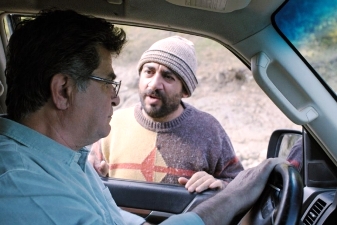
 The dissident Iranian director Jafar Panahi blurs the line between fact and fiction in his film about a village near the country’s border with Turkey.
The dissident Iranian director Jafar Panahi blurs the line between fact and fiction in his film about a village near the country’s border with Turkey.
In 2010, the Iranian government ruled that the director Jafar Panahi wouldn’t be allowed to make any more films. Now, even during periods of house arrest, Panahi has managed to cleverly get around the restrictions to continue making movies. His most recent film is called No Bears (the title is a joke that I won’t spoil), and it shows how he can take even the smallest slice of his life and turn it into art.
We’re in a town near the border between Iran and Turkey. A man and woman are arguing about a passport that is supposed to facilitate crossing the border out of Iran. She refuses to go without him, saying it’s unacceptable for her to go first and wait for him to follow, because she never wants to be separated from him again. Cut. It turns out that this is actually a scene being filmed for a movie. And Panahi, playing himself, is directing from afar—he’s renting a room from some generous residents of a village a few miles away, and from there he supervises the filming on his computer, sending instructions to the people at the site about the needed scenes and shots.
During a break in shooting, Panahi wanders around the village taking photographs of the people and scenery. Later, several men visit him in the house he’s renting. One of them informs him that his son is engaged to be married to a young woman, and that the wedding is coming soon. But some villagers claim that the woman has been secretly seeing another young man without social standing. It appears that while wandering about the town, Panahi took a photo which unintentionally showed the young woman talking with her lover. The men are now asking that he turn over the photo to them, to help forestall this local scandal. Panahi says he has no such picture. The men don’t believe him. As the film goes on, their demands become more insistent. He must show them all the photos in his camera and then swear that he’s telling the truth. Panahi doesn’t lose his composure. He eventually does swear to there being no such photograph. But of course, the doubt lingers.
So here we have the film we’re watching, No Bears, which includes this story of the photo. But then there’s the film within the film: the one that Panahi is making about people trying to get across the border. In both cases, the story involves a couple that are in some kind of trouble, albeit for different reasons. As the movie goes on, an odd thing happens. It becomes harder to distinguish which parts are from the film he’s making, and which are from the film we’re watching. They blend together. We think, this is all scripted, right? Or is it? Is one of the stories real, or part of it? The confusion is compounded by the actors in the film Panahi is making starting to argue with him about his decisions. And none of this is meant as a trick or a gimmick—Panahi isn’t saying “look how clever I am”—the blending of truth and fiction is a natural result of the director’s casual off-the-cuff style. And in so doing we realize, we experience, the purpose for which Panahi makes films: to illuminate reality through art, so that the meaning and urgency of our lives is manifest on film. No Bears is another brilliant work of art created seemingly out of almost nothing.
But there’s one thing I know that is real, unfortunately. After he finished making No Bears, the Iranian government accused him again of spreading anti-Islamic propaganda and they sent him to prison. Around the world, people who love the cinema are demanding: free Panahi.

